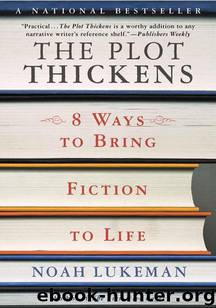The Plot Thickens by Noah Lukeman

Author:Noah Lukeman [Lukeman, Noah]
Language: eng
Format: epub
Published: 2011-03-22T07:00:00+00:00
4. The Ticking Clock. Adding a time limit goes a long way in creating suspense. If a student taking a test has as much time as he wants, it won't be nearly as suspenseful as if he had sixty seconds. A ticking clock can be used in select scenes—like in the classroom—or it can also be used to frame the entire work. Some works—especially action thrillers—are propelled by this alone. Twenty-four hours to save the president (Escape from New York)-, forty-eight hours to find the criminals (48 Hours)-, thirty days to spend all the money (Brewster's Millions), etc.
A clock needn't literally be a ticking clock. Simply going through your work and asking yourself precisely how many days or weeks or months transpire can be tremendously helpful. Many writers are out of touch with their time line, and it has been my experience that if you ask most writers exactly how much time transpires in their work, they'll be at a loss to answer. This is especially the case if time isn't a major factor in the work.
Why does your work transpire over three months instead of three weeks? Why three weeks instead of three days? Believe it or not, most works can accomplish just as much over a shorter period of time. In the process, a sense of urgency will be added. There will be suspense where there was none.
Even if you decide not to add a time pressure, it is enormously helpful to know exactly how much time transpires and what sort of use you make of it. It will help you get a handle on how much time you are allocating to which events, and in most cases, help you to better allocate this time. You will also be able to incorporate atmospherically the passing of time. For instance, knowing a certain event took place specifically on a Friday, you might incorporate your character getting off work early that day; knowing a particular event occurred during the summer, you might incorporate your character's not hearing his phone ring because of the hum of the air conditioner. These small details will help ground the work and bring it to life.
Remember that a clock in and of itself won't add suspense—it all depends on how you use the clock. The ticking clock is useless if the character doesn't check it; but if he is reminded of it at every turn, it can play a major role. In Manhunter, we are given a time limit in the very first scene: The detective has three weeks until the next full moon to find the killer. From the very first minute of the film, the pressure is on. The writer didn't even let that suffice; many scenes also have an additional time pressure of their own, for instance when the team of detectives have only twenty-five minutes to
solve a complicated riddle before a newspaper goes to press. Each time pressure propels us through each scene, while the greater time pressure propels us through the work and lends it direction.
Download
This site does not store any files on its server. We only index and link to content provided by other sites. Please contact the content providers to delete copyright contents if any and email us, we'll remove relevant links or contents immediately.
Asking the Right Questions: A Guide to Critical Thinking by M. Neil Browne & Stuart M. Keeley(5775)
Autoboyography by Christina Lauren(5235)
Eat That Frog! by Brian Tracy(4540)
Dialogue by Robert McKee(4401)
Sticky Fingers by Joe Hagan(4198)
Journeys Out of the Body by Robert Monroe(3624)
Annapurna by Maurice Herzog(3467)
Full Circle by Michael Palin(3449)
Schaum's Quick Guide to Writing Great Short Stories by Margaret Lucke(3380)
Elements of Style 2017 by Richard De A'Morelli(3349)
The Art of Dramatic Writing: Its Basis in the Creative Interpretation of Human Motives by Egri Lajos(3067)
Atlas Obscura by Joshua Foer(2961)
Why I Write by George Orwell(2952)
The Fight by Norman Mailer(2940)
The Diviners by Libba Bray(2937)
In Patagonia by Bruce Chatwin(2930)
The Mental Game of Writing: How to Overcome Obstacles, Stay Creative and Productive, and Free Your Mind for Success by James Scott Bell(2908)
Venice by Jan Morris(2573)
The Elements of Style by William Strunk and E. B. White(2473)
